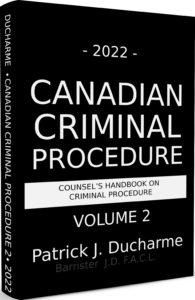 |
| Patrick Ducharme |
Disclosure refers to all relevant information or evidence available to the prosecutor and subject to disclosure to the defence to permit the defence a fair opportunity to prepare for trial. The Supreme Court of Canada in a unanimous decision held that the Crown is under a duty to disclose to the defence all evidence that could possibly be relevant to the case, regardless of whether the Crown plans to call that evidence at trial, or whether it helps or hurts the Crown’s case. The Supreme Court of Canada described in the duty of disclosure as follows:
“The Crown has a duty to disclose all relevant information to the defence. The fruits of the investigation which are in its possession are not the property of the Crown for use in securing a conviction, but the property of the public to be used to ensure that Justice is done.”
The court went on to say that this duty of disclosure is derived from the right of an accused to make full answer and defence which is entrenched in sections 7 of the Charter of Rights and Freedoms. The Crown, at least in indictable offences, is required to produce to the defence all relevant information whether the Crown intends to introduce it in evidence and whether it is inculpatory or exculpatory.
The Crown does not have discretion to withhold information, subject to very few exceptions. The Crown does have discretion to withhold information where necessary to protect the identity of an informer or the integrity of a continuing investigation. This discretion, however, must be exercised with respect to the relevance of the information. The exercise of this discretion is reviewable by the trial Judge who will be guided by the general principle that information ought not to be withheld if there is a reasonable possibility that the withholding of the information will impair the right of the accused to make full answer and defence.
The Crown may be able to withhold information if it is justified by the law of privilege. However, even then, the trial Judge might conclude that the recognition of an existing privilege does not constitute a reasonable limit on the constitutional right to make full answer and defence and thus require disclosure, despite the law of privilege.
Further, initial disclosure should occur before the accused is called upon to elect the mode of trial or to plead. The obligation to disclose will be triggered by a request by or on behalf of the accused. If the Crown disputes the existence of material that the defence alleges is relevant, the defence must establish a basis that enables the presiding Judge to conclude that there is in existence further material that is potentially relevant. Relevance in this context means that there is a reasonable possibility of the information being useful to the accused in making full answer and defence. The existence of the disputed material must be sufficiently identified to reveal its nature and enable the trial Judge to determine that it may meet the test for requiring disclosure.
In most cases this preliminary issue can be determined based on submissions of counsel. If the defence meets the preliminary test, that is, a reasonable possibility of the information being useful to the accused in making full answer and defence, then the Crown must justify a continuing refusal to disclose and is entitled to call relevant evidence on that issue. Consequently, the limited ability to withhold information by the Crown relates to.
a. evidence that is clearly irrelevant, or,
b. may be privileged, or,
c. may adversely impact an ongoing criminal investigation.
An application by counsel for the accused to obtain disclosure will be guided by the general principle that the Crown has a duty to disclose all information whenever there is a reasonable possibility that the information could be useful to the accused in making full answer and defence. This duty to disclose gives rise to a corresponding constitutional right to the disclosure of all material which meets this threshold for disclosure.
The right to disclosure is violated where the accused demonstrates a reasonable possibility that the undisclosed information could be used in meeting the case for the Crown, advancing a defence, or otherwise making a decision that could affect the conduct of the defence.

The above is the an excerpt of Patrick J Ducharme's book, Canadian Criminal Procedure Volume 2, available at Amazon or in bulk through MedicaLegal Publishing along with Criminal Trial Strategies.
Subscribe to Patrick Ducharme's Youtube Channel
